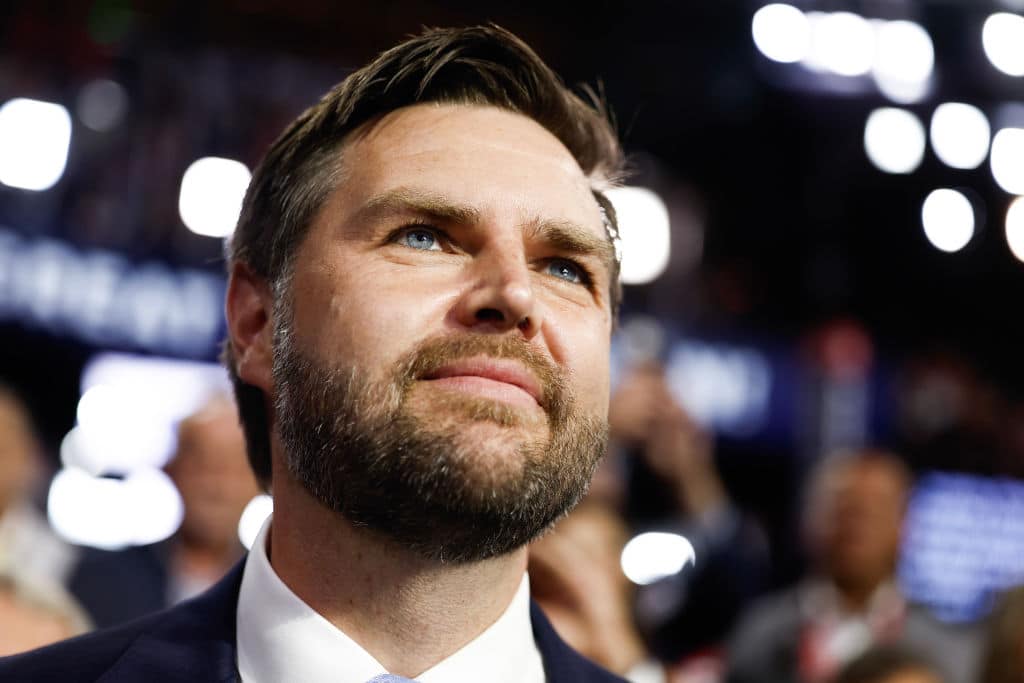JD Vance is the star speaker tonight at the third and final night of the 15-18 July Republican National Convention. His appearance follows the announcement that he will be Donald Trump's running mate and vice-presidential nominee for the US presidential election in November. <br><br>Donald Trump may be presenting himself to American voters as a unifier, after surviving the attempt on his life, but the pundits have not seen his appointment of JD Vance as running mate as a move designed to win over the middle ground.<br><br><strong>RELATED: <a href="https://catholicherald.co.uk/trump-appoints-firebrand-pro-life-catholic-as-vp-running-mate-and-political-heir/"><mark style="background-color:rgba(0, 0, 0, 0)" class="has-inline-color has-vivid-cyan-blue-color">Trump nominates ‘firebrand’ pro-life Catholic as VP running mate and political heir</mark></a></strong>
Mr Vance is 39, while Mr Trump is 78. He is combative and often uncompromising. His book, <em>Hillbilly Elegy</em>, is an important account of the way in which mainstream US politics, specifically the Democrats, lost touch with the rural white working class; he does, therefore, have personal experience of living on the political periphery though his personal upward trajectory has been steep.
He is also a Catholic convert, having been received into the Church in 2019, and has written movingly and intelligently about why and how he did so. His brief spell as an atheist was unhappy, his movement back to faith was based on reflection and wide reading – there are not many US politicians who can quote Augustine on the problems with a literalist interpretation of Scripture. A moving passage in his essay on his conversion is worth reflecting on:
“I slowly began to see Catholicism as the closest expression of [my grandmother’s] kind of Christianity: obsessed with virtue, but cognizant of the fact that virtue is formed in the context of a broader community; sympathetic with the meek and poor of the world without treating them primarily as victims; protective of children and families and with the things necessary to ensure they thrive. And above all: a faith centred around a Christ who demands perfection of us even as He loves unconditionally and forgives easily.”
President Trump’s running mate, then, knows that the Faith demands both individual responsibility and social solidarity, and that we must forgive our enemies. Quite how this would affect him as vice president, were Donald Trump to be elected president, is not clear-cut.
But his Catholicism does at least mean that he has assumptions about the common good which all Catholics and many Christians can understand, and has a belief in God which puts political ambition in perspective and a moral outlook which seeks the protection of the vulnerable as well as the powerful. He knows that if he occupies a position of power, he will be accountable to God for the way he uses it; that is a very good thing.
Having said as much, it will be interesting to see how this translates into practice. Mr Vance, for instance, has robust views on illegal immigration; that is perfectly compatible with Catholicism, so long as its proponents do not diminish the humanity of those who find themselves on the wrong side of the law. The US bishops take a different view from his on this important question, but Catholics are not obliged to follow the prescriptions of the bishops on political questions, though they must treat their views with respect. More than this, we are obliged to see the face of Christ in the outcast.
At the very least we can hope, then, that Mr Vance will not use cruel language about illegal migrants, even if he seeks to repatriate them. Indeed, it is almost a moral obligation for those who do try to exclude illegal migrants to seek to improve conditions in their countries of origin. Given their shared assumptions about human flourishing, it should be possible for Mr Vance and the bishops to discuss these differences in a civil and respectful fashion.
Of course, President Biden is a Catholic too, and there are many Catholics who are unimpressed by his outlook and his record. It would be dispiriting simply to reduce every political judgment to the question of abortion, but President Biden’s record on this has been squarely at odds with the views of the Church and hard to reconcile with the palpable humanity of the foetus.
Mr Vance’s approach is rather different; he is pro-life, but he has supported the legality of one widely used abortion drug. He recognises the humanity of the foetus and also the difficult situation of many of those who seek abortion. His views may not be as clear cut as that of some pro-lifers but his recognition of abortion as a moral evil is welcome. He has been brave in taking a politically risky stance on this contentious issue and we should acknowledge that.
On Ukraine, he would seek to reduce US spending on arms for Ukraine and to expedite a peace process, which necessarily entails engagement with Russia. Again, there is no categorically Catholic policy on issues of war and peace, except a bias to peace and an absolute insistence that neither side should deliberately target innocent non-combatants, as Russia has certainly done.
It is also important that Mr Vance should be absolutely truthful about the nature of this conflict, which was initiated by Russia; it is a clear war of aggression. Yet God loves the peacemaker, and if Mr Vance’s approach is intended not only to reduce American involvement in foreign wars – he has military experience himself – but to reduce human cost of this terrible conflict, he should not be demonised for his views.
Where he can and should take a stance is on the conflict in Gaza. No one can question the gruesome cruelties of the Hamas atrocities against Israelis last October and the terrible situation of Israeli hostages, but to say as much is not to justify the response of Benjamin Netanyahu’s government. The disproportionate and indiscriminate nature of the response has resulted in tens of thousands of casualties and the destruction of the homes, lives and livelihoods of countless innocent Palestinians.
The US government has criticised Israel but it should do far more to hold its government to account. Well before the original attack, the expansion of Israeli settlements in the Occupied Territories compromised hopes of peace, and the behaviour of settlers backed by extremist nationalist parties was disastrous for Palestinian Christians and inimical to the real interests of Israel. It is time for politicians such as Mr Vance to take a robust stance on this conflict.
The <em>Catholic Herald</em> welcomes his appointment, not from a partisan perspective, but because it is good when thoughtful Catholics become involved in politics. There will, inevitably, be occasions when he may have to compromise on the best option in order to do as much good as he can, but that is in the nature of things. If he bears in mind that he will be accountable to God for his actions he will be a better public servant. As Christ said (Luke 12:48): “unto whomsoever much is given, of him shall much be required; and to whom men have committed much, of him they will ask the more.”
We wish him well.<br><br><em>Photo: Donald Trump's pick for Vice President, US Sen. JD Vance (R-OH), arrives on the first day of the Republican National Convention at the Fiserv Forum in Milwaukee, Wisconsin, 15 July 2024. (Photo by Anna Moneymaker/Getty Images.)</em>



